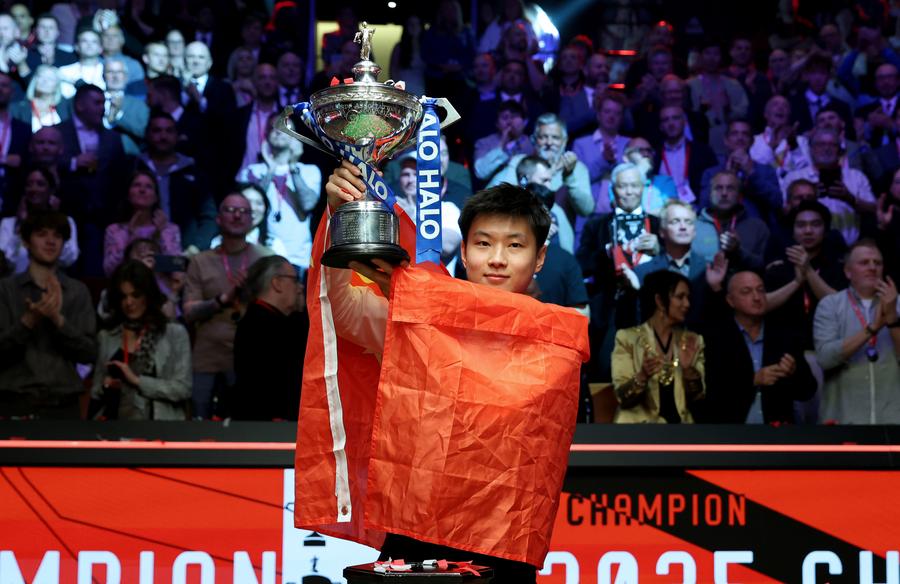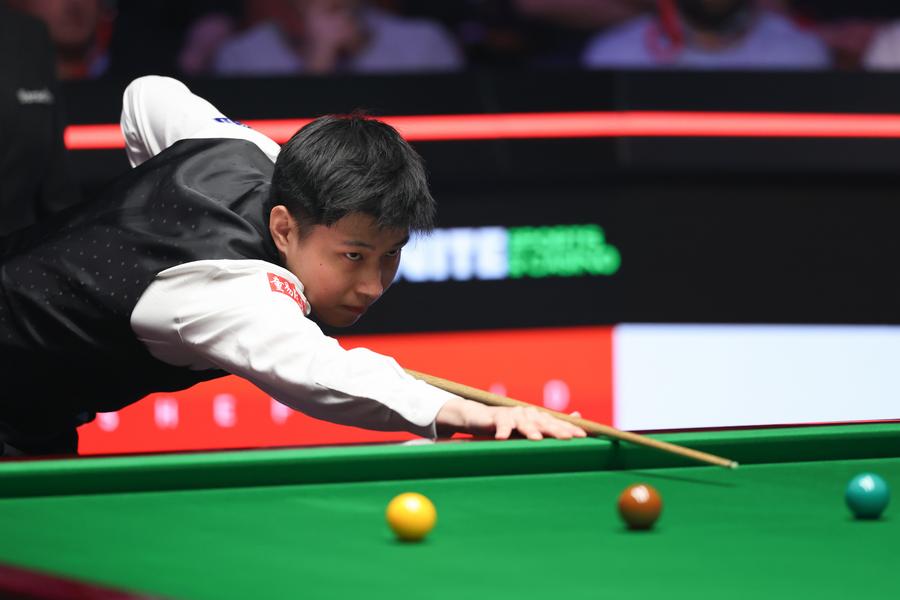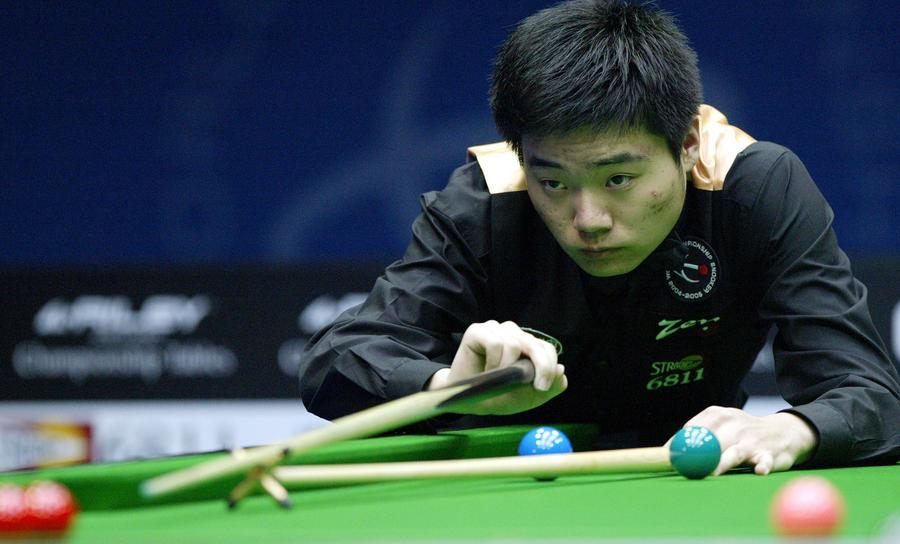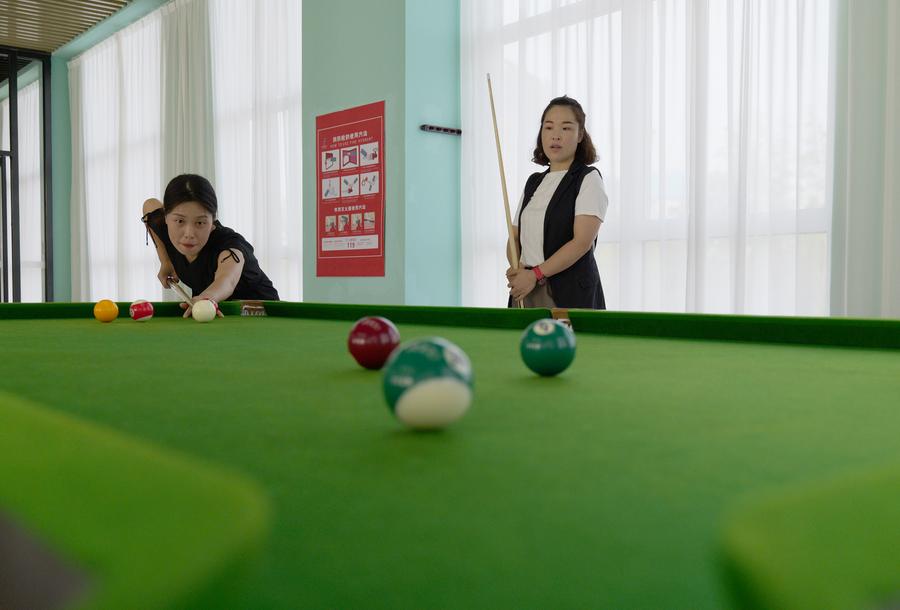
Zhao Xintong celebrates with the trophy after beating Mark Williams to win the 2025 World Snooker Championship in Sheffield, United Kingdom, May 5, 2025. (Photo by Zhai Zheng/Xinhua)
Zhao Xintong's historic victory as the first Asian to win the World Snooker Championship marks a new era for Chinese snooker, reflecting decades of growth, investment, and increasing global influence in the sport.
by sportswriters Yue Wenwan, Zheng Zhi, Zhang Wei and Wang Haoming
In a moment that will reverberate far beyond the walls of the Crucible Theatre, China's Zhao Xintong etched his name into sporting history by becoming the first Asian to win the World Snooker Championship.
With a commanding victory over three-time world champion Mark Williams, 28-year-old Zhao not only claimed his first world title, but also redefined the global landscape of a sport long dominated by British players.
"I can't believe it. It's like a dream," said Zhao, his voice trembling as he raised the Chinese national flag beside the table.
Just months earlier, Zhao had rejoined competitive events as an amateur following a 20-month suspension for his involvement in match-fixing. His success at the Crucible was more than a win. It was a moment of arrival for himself, for Chinese snooker, and for the global game.

Zhao Xintong in action during the final, May 5, 2025. (Photo by Zhai Zheng/Xinhua)
A MILESTONE FOR ASIA
Zhao's win marks the first time in snooker's modern history since 1969 that the world title has been won by an Asian player. He becomes the fourth champion from outside the United Kingdom and Ireland, following Canada's Cliff Thorburn (1980), Neil Robertson of Australia (2010), and Belgium's Luca Brecel (2023).
Yet Zhao's victory added symbolic weight: it is the culmination of China's decades-long effort to develop snooker from a niche interest to a national movement.
"I once said, 'I'm glad to see that the threshold I shattered back then has become a runway for everyone.' Today someone has finally crossed the finish line on that runway," wrote Chinese icon Ding Junhui, who reached the World Championship final in 2016.
"He has achieved the dream that generations of Chinese snooker players have shared," Ding added.
Zhao's triumph echoed another landmark moment for Chinese snooker two decades ago. In the 2005 China Open final, Ding, then just 18 and playing as a wildcard, stunned the snooker world by defeating legend Stephen Hendry to claim China's first ranking title.

Ding Junhui goes for a long pot against Stephen Hendry during the 2005 China Open final at the Haidian Stadium in Beijing, April 3, 2005. (Xinhua Photo/Bi Mingming)
However, the sport itself faced a turning point. At that time, snooker was struggling in its traditional heartland. A European Union ban on tobacco advertising had stripped the sport of long-time sponsors, and its unpredictable match durations made broadcasting inconvenient. By the 2005-06 season, the snooker calendar had shrunk to just six ranking events.
At that critical juncture, China's interest in the game, backed by a vast population, emerging media market and surging youth participation, proved to be a lifeline. Ding's victory helped ignite a snooker boom in China that would change the sport's future.
In the 2024-25 season, snooker has nearly 20 ranking tournaments, a dramatic revival made possible, in large part, by China's sustained investment and growing influence.
Once there was only Ding as an elite Chinese player; now there is a whole generation. A record 10 Chinese players qualified for the main draw at this year's World Championship, six of whom reached the last 16. Moreover, nine Chinese players are currently ranked inside the world's top 32.

Si Jiahui in action against David Gilbert in the first round of the 2025 World Snooker Championship, April 22, 2025. (Photo by Zhai Zheng/Xinhua)
This depth of talent is no accident. Over the past two decades, China has invested heavily in snooker infrastructure from grassroots clubs to elite academies. In cities like Dongguan, Guangzhou and Beijing, children learn the sport in specialized training centers, guided by a growing network of coaches, many of them trained overseas.
"Snooker used to be seen as just a hobby," said Huang Zhufeng, head of the World Snooker Academy's Guangdong branch. "Now it's a real career path -- a sport the country is proud of."
FROM CHINA TO WORLD
As the talent pool expanded, so did the calendar. China now hosts nearly one-third of professional ranking events each season, far more than any other country outside the U.K..
Tournaments in cities like Beijing, Shanghai, Wuhan, and the small but iconic town of Yushan are now fixtures on the global snooker circuit. The Yushan International Billiards Culture Center, home to the World Snooker Hall of Fame and Museum, has been dubbed "the second Crucible" by players.

John Higgins (L) looks on as Mark Davis prepares to take a shot during their second round contest at the Snooker World Open in Yushan, east China's Jiangxi Province, Feb. 23, 2025. (Xinhua/Zhou Mi)
Jason Ferguson, chairman of the World Professional Billiards and Snooker Association, said the sport's growth in China has reshaped its global future.
"China has developed its own history in the sport. It's no longer a U.K.-based sport, and it's no longer just U.K. players. We've learned a lot in China of how to develop snooker, and some of those things we've learned, we are now taking them to new countries and helping those to develop as well," Ferguson said.
The sport also has a fast-growing fanbase in China. A report shows that by 2022, China's billiards and snooker enthusiasts have surpassed 210 million, with an increase of 180 percent year-on-year. According to a survey from data analysis provider iiMedia Research, more than 100,000 billiards-related businesses were registered in China in 2023 alone. In April 2024, the number of 24-hour self-service snooker halls grew by 25 percent year-on-year.

Two enthusiasts play billiards at an indoor fitness center in Lixue Community Sports Park, Luoyang, China's Henan Province, Aug. 17, 2023. (Xinhua/Li Jianan)
Millions of Chinese fans tuned in to Zhao's final late at night, with their excitement visible in the fast-scrolling comments flooding livestream platforms.
For a long time, snooker was a sport of British tradition. Zhao's victory symbolized the start of a new chapter: one that reflects a more global, diverse, and dynamic future for the sport.
"I did realize that my victory is important for Chinese snooker," Zhao said in an exclusive interview with Xinhua.
"Zhao's title highlights China's 40-year resilient snooker journey on the global stage. What we're seeing now is just the beginning," Huang noted.
 Editor:Qiu Xiaochen
Editor:Qiu Xiaochen